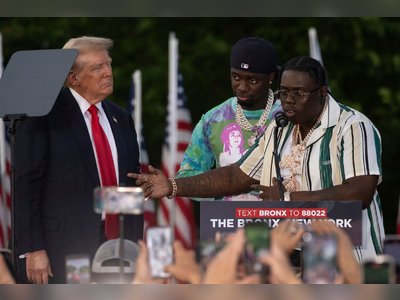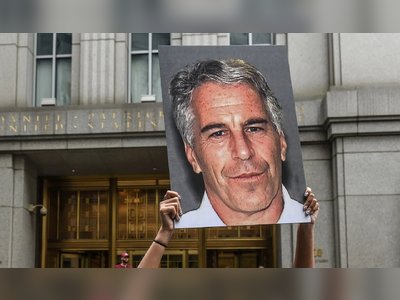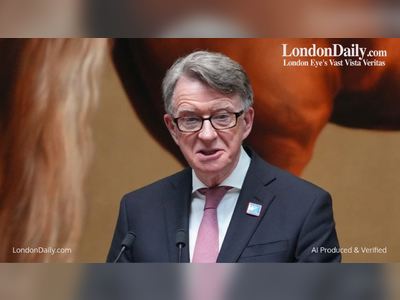Guns and abortion: Contradictory decisions, or consistent?
They are the most fiercely polarizing issues in American life: abortion and guns. And two momentous decisions by the Supreme Court in two days have done anything but resolve them, firing up debate about whether the court’s conservative justices are being faithful and consistent to history and the Constitution — or citing them to justify political preferences.
To some critics, the rulings represent an obvious, deeply damaging contradiction. How can the court justify restricting the ability of states to regulate guns while expanding the right of states to regulate abortion?
“The hypocrisy is raging, but the harm is endless,” House Speaker Nancy Pelosi said Friday after the court released its decision on abortion.
To supporters, the court’s conservatives are staying true to the country’s founding principles and undoing errors of the past.
The court corrected a historic wrong when it voided a right to abortion that has stood for nearly 50 years, former Vice President Mike Pence said Friday. On Twitter, he said the decision returned to Americans the power to “govern themselves at the state level in a manner consistent with their values and aspirations.”
Opponents of Roe v. Wade, the controversial 1973 ruling that upheld the right to abortion, say the Supreme Court back then did just what some accuse the majority justices of doing now, adapting and twisting legal arguments to fit political positions.
Members of the court’s current conservative majority, laying out their thinking in this week’s decisions, have been quite consistent, sticking to the words of the country’s founders and the precedents of history that reach back even further, those supporters say.
In both decisions, the majority makes the case that if a right is spelled out in the U.S. Constitution, the bar for any government regulation of that right is extremely high. But if a right is not explicit, state and federal governments have greater leeway to impose regulations.
To those who study the court, though, the reality is more complicated.
A number agree that, for all the controversy of the rulings, the majority justices at least followed a consistent legal theory in issuing the decisions on abortion and guns.
“I understand how it might look hypocritical, but from the perspective of the conservative majority on the court, it’s a consistent approach to both cases,” said Richard Albert, law professor at the University of Texas at Austin. “I’m not saying it’s correct, by the way, but from their perspective it is completely consistent and coherent.”
Consistency, though, cannot mask the fact that there has been a seismic shift on the court since President Donald Trump appointed three conservatives. And that is likely to further muddy public perceptions of an institution that prefers to see itself as being above politics, court watchers say.
Both decisions “come from the same court whose legitimacy is plummeting,” said Laurence Tribe, a leading scholar of Constitutional law and emeritus professor at the Harvard Law School.
The court majority’s decisions on gun rights and the ruling a day later on abortion both rely on a philosophy of constitutional interpretation called “originalism.” To assess what rights the Constitution confers, originalists hone in on what the texts meant when they were written.
Opinions by originalists are often laden with detailed surveys of history, as both these rulings are.
The bulk of Justice Clarence Thomas’ opinion on gun rights is devoted to history and what it says about the Founders’ intentions when they crafted the Second Amendment and when lawmakers crafted the 14th Amendment on due process in the 1860s. Thomas broached a long list of historical figures, including the English King Henry VIII, who the ruling says worried that the advent of handguns threatened his subjects’ proficiency with the longbow.
The abortion ruling authored by Justice Samuel Alito similarly delves deep into the past, concluding that there was nothing in the historical record supporting a constitutional right to obtain an abortion.
“Not only was there no support for such a constitutional right until shortly before Roe, but abortion had long been a crime in every single state,” Alito wrote.
This week’s two decisions are more legally consistent than critics suggest, said Jonathan Entin, a law professor emeritus at Case Western Reserve University in Cleveland.
“We can debate about the meaning of the Second Amendment, but the Second Amendment does explicitly talk about the right to keep and bear arms, whereas the right to abortion access is not explicitly in the Constitution,” he said. “If that’s where you are going to go, then maybe these decisions are not in such tension after all.”
Not all observers agree.
“I think there is a double standard going on here,” said Barry McDonald, a professor of law at Pepperdine University, reviewing the justices’ arguments that both decisions are grounded in a strict reading of the law and of history. That logic is shaky, he said, given the conclusion by many legal historians that the right to bear arms in the Bill of Rights is, in fact, much narrower than the court majority insists.
Most ordinary Americans, though, will be unfamiliar with such intricate legal theory. Instead, many will size up the court’s actions based on their perceptions of the justices’ motives and the personal implications of the decisions, experts said.
Many are likely to view the rulings as the direct result of Trump’s appointments and the justices’ determination to carry out his agenda, making the court “more of an institution of politics than it is of law,” McDonald said.
Tribe said the court’s majority has embraced an imaginary past and its claims that is only upholding the law are false. The majority justices can assert that they have been legally consistent. But taken together, he said, the decisions on guns and abortion create a whiplash effect from a court that claims to be protecting individual rights, then effectively limited many Americans’ control over their own bodies.
“I think the decisions point in radically different directions,” Tribe said, “but the one thing they have in common is they are decided by a new, emboldened majority that knows no limits on its own power and is perfectly willing to toss over precedent in the name of a version of originalism that really doesn’t hold together.”
“The hypocrisy is raging, but the harm is endless,” House Speaker Nancy Pelosi said Friday after the court released its decision on abortion.
To supporters, the court’s conservatives are staying true to the country’s founding principles and undoing errors of the past.
The court corrected a historic wrong when it voided a right to abortion that has stood for nearly 50 years, former Vice President Mike Pence said Friday. On Twitter, he said the decision returned to Americans the power to “govern themselves at the state level in a manner consistent with their values and aspirations.”
Opponents of Roe v. Wade, the controversial 1973 ruling that upheld the right to abortion, say the Supreme Court back then did just what some accuse the majority justices of doing now, adapting and twisting legal arguments to fit political positions.
Members of the court’s current conservative majority, laying out their thinking in this week’s decisions, have been quite consistent, sticking to the words of the country’s founders and the precedents of history that reach back even further, those supporters say.
In both decisions, the majority makes the case that if a right is spelled out in the U.S. Constitution, the bar for any government regulation of that right is extremely high. But if a right is not explicit, state and federal governments have greater leeway to impose regulations.
To those who study the court, though, the reality is more complicated.
A number agree that, for all the controversy of the rulings, the majority justices at least followed a consistent legal theory in issuing the decisions on abortion and guns.
“I understand how it might look hypocritical, but from the perspective of the conservative majority on the court, it’s a consistent approach to both cases,” said Richard Albert, law professor at the University of Texas at Austin. “I’m not saying it’s correct, by the way, but from their perspective it is completely consistent and coherent.”
Consistency, though, cannot mask the fact that there has been a seismic shift on the court since President Donald Trump appointed three conservatives. And that is likely to further muddy public perceptions of an institution that prefers to see itself as being above politics, court watchers say.
Both decisions “come from the same court whose legitimacy is plummeting,” said Laurence Tribe, a leading scholar of Constitutional law and emeritus professor at the Harvard Law School.
The court majority’s decisions on gun rights and the ruling a day later on abortion both rely on a philosophy of constitutional interpretation called “originalism.” To assess what rights the Constitution confers, originalists hone in on what the texts meant when they were written.
Opinions by originalists are often laden with detailed surveys of history, as both these rulings are.
The bulk of Justice Clarence Thomas’ opinion on gun rights is devoted to history and what it says about the Founders’ intentions when they crafted the Second Amendment and when lawmakers crafted the 14th Amendment on due process in the 1860s. Thomas broached a long list of historical figures, including the English King Henry VIII, who the ruling says worried that the advent of handguns threatened his subjects’ proficiency with the longbow.
The abortion ruling authored by Justice Samuel Alito similarly delves deep into the past, concluding that there was nothing in the historical record supporting a constitutional right to obtain an abortion.
“Not only was there no support for such a constitutional right until shortly before Roe, but abortion had long been a crime in every single state,” Alito wrote.
This week’s two decisions are more legally consistent than critics suggest, said Jonathan Entin, a law professor emeritus at Case Western Reserve University in Cleveland.
“We can debate about the meaning of the Second Amendment, but the Second Amendment does explicitly talk about the right to keep and bear arms, whereas the right to abortion access is not explicitly in the Constitution,” he said. “If that’s where you are going to go, then maybe these decisions are not in such tension after all.”
Not all observers agree.
“I think there is a double standard going on here,” said Barry McDonald, a professor of law at Pepperdine University, reviewing the justices’ arguments that both decisions are grounded in a strict reading of the law and of history. That logic is shaky, he said, given the conclusion by many legal historians that the right to bear arms in the Bill of Rights is, in fact, much narrower than the court majority insists.
Most ordinary Americans, though, will be unfamiliar with such intricate legal theory. Instead, many will size up the court’s actions based on their perceptions of the justices’ motives and the personal implications of the decisions, experts said.
Many are likely to view the rulings as the direct result of Trump’s appointments and the justices’ determination to carry out his agenda, making the court “more of an institution of politics than it is of law,” McDonald said.
Tribe said the court’s majority has embraced an imaginary past and its claims that is only upholding the law are false. The majority justices can assert that they have been legally consistent. But taken together, he said, the decisions on guns and abortion create a whiplash effect from a court that claims to be protecting individual rights, then effectively limited many Americans’ control over their own bodies.
“I think the decisions point in radically different directions,” Tribe said, “but the one thing they have in common is they are decided by a new, emboldened majority that knows no limits on its own power and is perfectly willing to toss over precedent in the name of a version of originalism that really doesn’t hold together.”














